For it is easier to shout stop! than to do it.
Another forest, another shift in the story. Entering into the Old Forest plunged Frodo & Company into the different and the unknown, officially severing them from the relative comforts of the Shire. It also highlighted the dangers to come, as the hobbits, expecting external dangers, instead fell prey to internal ones.
When Merry and Pippin enter Fangorn and meet Treebeard and the Ents, it feels at first like an echo of the earlier chapter. Both forests are “queer” and “stifling.” In both forests the hobbits try to climb to a higher point to escape the forest’s canopy. But Fangorn isn’t the Old Forest, and Treebeard isn’t Tom Bombadil. And Merry and Pippin aren’t the same hobbits they were when the fell asleep at the roots of Old Man Willow. “Treebeard” is one of the most delightful and interesting chapters so far in The Lord of the Rings, one that manages to linger on linguistics, veer off into myths, yet also delve into key themes that propel forward the stories of Merry and Pippin.
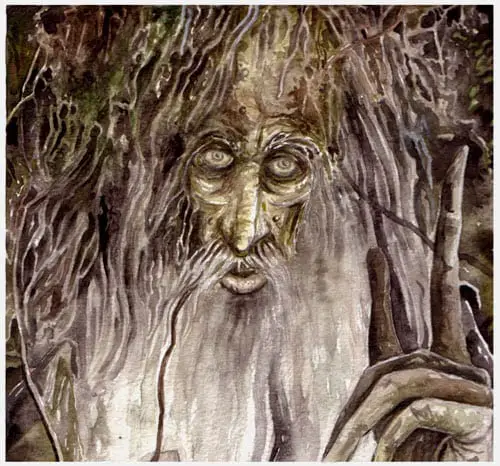
Treebeard
Before we get into anything else: Treebeard is absolutely wonderful. He’s an odd, composite character. He’s entirely his own creature, yet he also manages to act as a reflection of both hobbits and elves and call to mind some of the cadences of Gandalf a chapter before his return.
Honestly, you’d have thought that Merry and Pippin would have learned their lessons by now, and would never again turn their backs on gnarled tree-figures in mysterious forests. But as Treebeard notes, they’re inherently hasty folk. After Pippin casually mentions that he’s almost beginning to like Fangorn, Treebeard bursts into the story.
“Almost felt you liked the Forest! That’s good! That’s uncommonly kind of you,” said a strange voice. “Turn round and let me have a look at your faces. I almost feel that I dislike you both, but do not let us be hasty.”
He’s a mixture of sarcastic levity and deep depths: he has a voice like a “deep woodwind instrument” and eyes like “sun shimmering… on the ripples of a very deep lake.” He cautions himself against hastiness and admits he would have crushed the hobbits with his feet if he hadn’t liked their voices, in nearly the same breath. It’s a good introduction to Ents. They are a study in contrasts, never quite what you’d expect them to be. They are provincial and worldly, quiet with a deep love of words, profoundly powerful and angry but very, very still. They’re like big boulders poised on the edge of a cliff for generations, only to start rolling at the sound of a “nice, little” hobbit voice.
Unlearnable Languages
Language is compromise: use it as well as you want, but there’s no way around it. You can have all the words in the world, decline the nouns and conjugate the verbs in any way you wish. In the end, though, you can only hope that the meaning you intended is the one that gets conveyed.
In this light, Ents and their language must have been a joy for a linguist like Tolkien. Old-Entist rests comfortably at the far end of the language spectrum. Its specificity is unmatched, combining mashed-together adjectives and nouns at a rate that would intimidate a native German speaker and altering the tone and length of vowels to the extent that the language is unlearnable by anyone else.
“Slow, sonorous, agglomerated, repetitive, indeed long-winded; formed of a multiplicity of vowel-shades and distinctions of tone and quantity which even the lore-masters of the Eldar had not attempted to represent in writing. They used it only amongst themselves but had no need to keep it secret, for no others could learn it.”
On one hand, it’s beautiful. It’s a language that insists upon detail, and context, and story. A chair isn’t just a chair, a tree isn’t just a tree, an Ent isn’t just an Ent. Those names are too vague, lumping vastly disparate things together. As Treebeard says, names grow with the things that they name:
“My name is growing all the time, and I’ve lived a very long time; so my name is like a story. Real names tell you the story of the things they belong to in my language, in the Old-Entish, you might say. It is a lovely language, but it takes a very long time to say anything in it.”
Beyond Treebeard’s explicit statement, there are hints of this all over the chapter. When Pippin raises the question of Lothlórien, Treebeard warns them to “not risk getting tangled in the woods of Laurelindórinan! That is what the Elves used to call it, but now they make the name shorter: Lothlórien they call it. Perhaps they are right: maybe it is fading, not growing.” Names change when the things they name change.
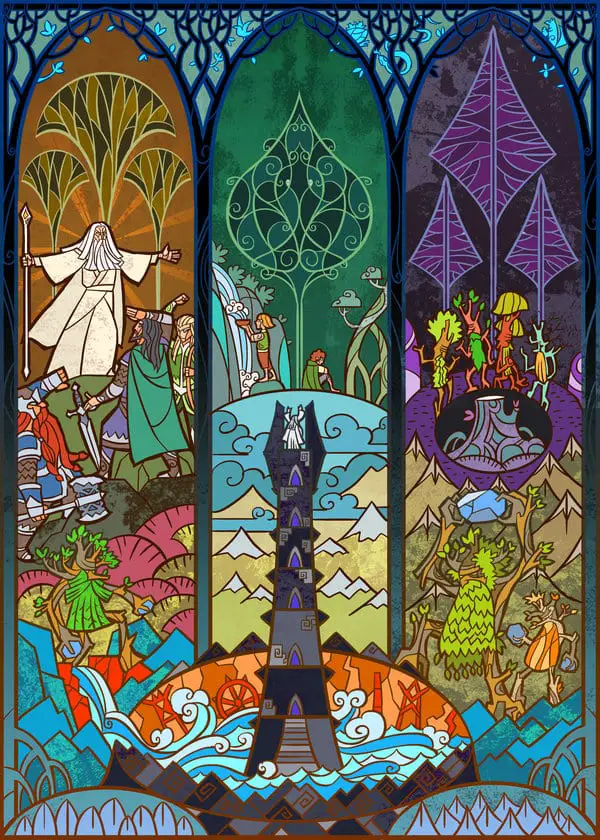
Old Entish
It’s a dizzying amount of specificity and precision for a language. It can even be grasped when Pippin mistakes Treebeard’s claim that they had “lost” the Entwives as a euphemism for their death. “They did not die!” said Treebeard. “I never said died. We lost them, I said. We lost them and we cannot find them.” It’s a touchy subject in general, of course. But there’s also the sense that Treebeard’s annoyance comes from the hastiness of the assumption, from the linguistic misinterpretation itself.
In this light, Old Entish is beautiful. It’s slow, thoughtful, precise. It’s a meticulous language, conscious of the individual specificity of things, aware of their context and layers and complexity. It seems very wise.
But there’s a price for all this: convenience, practicality, and action.
Entish is a silly-sounding language from a practical point of view. In the appendices, Tolkien relates that Treebeard’s Taurelilómëa-tumbalemorna Tumbaletaurëa Lómëanor (in the Elvish-influenced New Entish) conveys something along the lines of “there is a shadow of the Great Darkness in the deep dales of the forest.” A nice, ominous-sounding phrase. In Entish, literally, it translates as Forestmanyshadowed-deepvalleyblack Deepvalleyforested Gloomyland. It’s… inelegant.
It’s also a language that matches Fangorn itself: it’s old and agglomerated and over-filled. Pippin comes close to the mark when he’s describing the forest at the start of the chapter. “It reminds me, somehow, of the old room in the Great Place of the Tooks away back in the Smials at Tuckborough: a huge place, where the furniture has never been moved or changed for generations.” He’s close, but not quite right. The Entish language is like that, but if new generations added to furniture bit by bit, every year.
Pippin gets closer near the end of his description: “Most of the trees seem to be half-covered with ragged dry leaves that have never fallen. Untidy. I can’t imagine what spring would look like here, if it ever comes; still less a spring cleaning.” Old-Entish never cleans itself out. Which wouldn’t be a problem, except for the fact that this over-stuffing of itself is stifling the Ents. They are getting sleepier and sleepier, more and more tree-like under the layers of leaves, the draping of moss, and the accumulation of their own history.
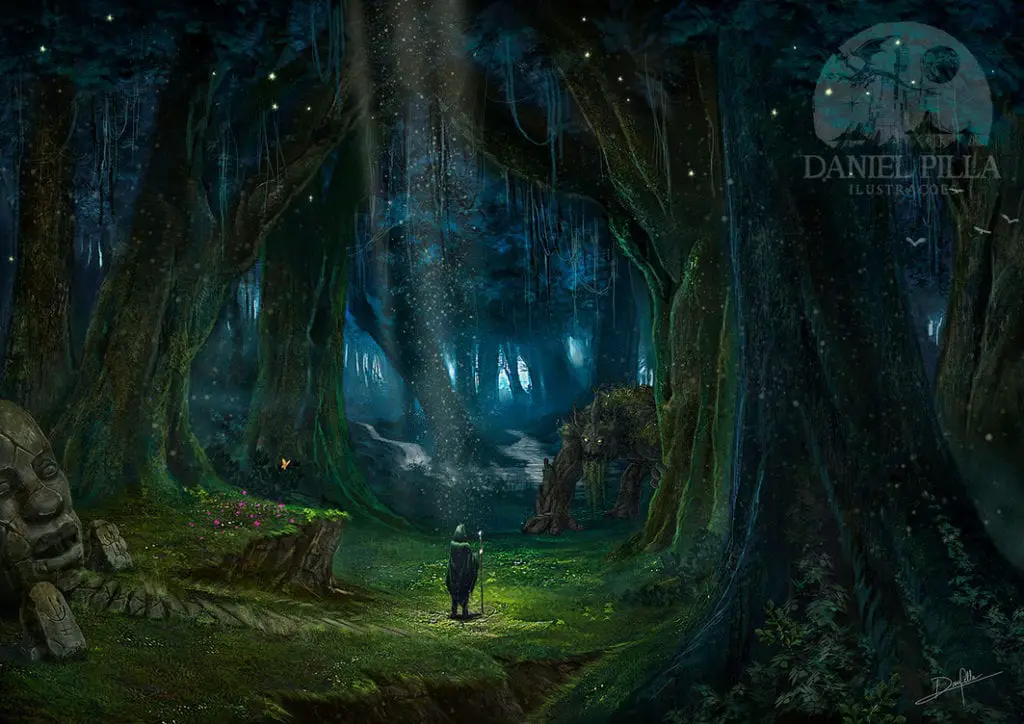
Elves and Ents
If Ents were linguistic purists, they’d all have turned to trees a long time ago. It’s the problem with requiring a descriptor to account for every detail of its object: it’s impossible, and would require an endless amount of time. By trying to account for every detail, you simply wind up sitting and thinking or speaking all day. You never actually act.
But Ents absolutely do act, as we see near the end of the chapter. They haven’t all turned to trees, though Treebeard seems to suggest that there is a slow, inexorable pull. Despite Treebeard’s repeated condemnation of hastiness, he’s rather hasty himself (though not perhaps as much as that ultra-hasty Quickbeam). He almost stomps Merry and Pippin. He calls an Entmoot after just a day with hew new hobbit friends. And he convinces a forest to go to war, to a “last march,” in the space of two days.
And it’s this layer that really endears the Ents to me. It would have been so easy for Ents to be old and immovable, provincial and passive. Like Elves, but worse. But Treebeard is rather critical of Elves:
“Elves began it, of course, waking trees up and teaching them to speak and learning their tree-talk. They always wished to talk to everything, the old Elves did. But then the Great Darkness came, and they passed away over the Sea, or fled into far valleys, and hid themselves, and made songs about days that would never come again.”
There’s a sense of disappointment here: that Elves have essentially abdicated from action, too inflexible to keep up with the changes in the world. Of course, this is quite a charge coming from a being who has barely left the borders of his forest. But there is a flexibility to Treebeard. If there’s a benefit to Entish accumulation of descriptions and information, it’s that it becomes infinitely more possible to change one’s mind, and change with the development of the times.
“For Ents are more like Elves: less interested in themselves than Men are, and better at getting inside other things. And yet again Ents are more like Men, more changeable than Elves are, and quicker at taking the color of the outside.”
You can see it in Treebeard’s eyes: there’s a deep, unfathomable well behind them. But there’s also a vibrant, ever-present spark. And it’s clear from the first time we meet Treebeard. When he encounters hobbits, he does not try to jam them onto the “old list” where they don’t belong. He simply seems them as something new and responds accordingly. “You do not seem to come in the old list I learned when I was young. But that was a long, long time ago, and they may have made new lists.” Treebeard responds to new information by providing new space for it. There’s an instability inherent in Ents, because of this. Despite all their years of slow accumulation, there’s a layer underneath that always posits the possibility of change, and of action.
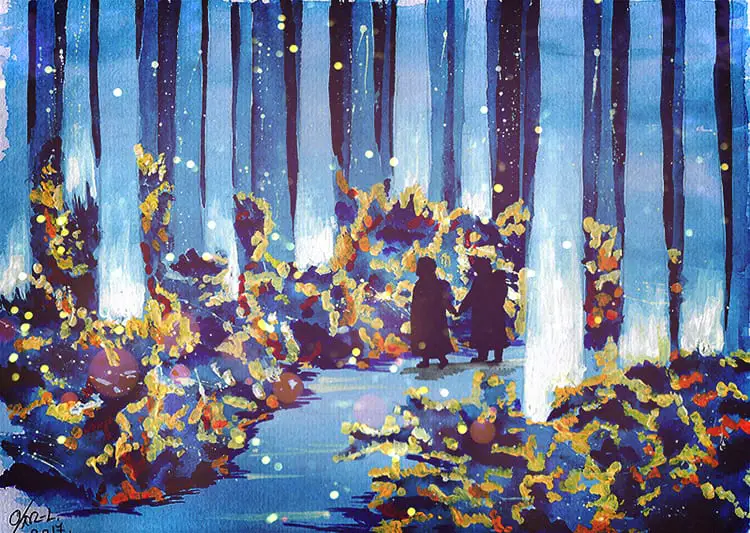
Provinciality, Hobbits, and Action
If Ents share a commonality with Elves, they also share one with hobbits. Both, at heart, are local, provincial peoples. Hobbits, as we’ve heard from the beginning, have relatively little interest in the outside world. They distrust foreigners, and the vast majority of hobbits never ventured beyond the borders of the Shire. Nor do they have much desire to do so.
Treebeard seems similar. He does not know about the Ring, but it likely would only make an abstract impression upon him. Mordor, he says, does not trouble him much – it is a very long ways away. There’s a self-interested aspect to Treebeard. “I am not altogether on anybody’s side,” he explains to the hobbits, “because nobody is altogether on my side.” (Treebeard, it seems, has to read up on his Desmond Tutu).
Saruman, though, is a different story:
“But Saruman, now! Saruman is a neighbor. I cannot overlook him. I must do something, I suppose. I have often wondered lately what I should do about Saruman… There are wastes of stump and bramble where once there were singing groves. I have been idle. I have let things slip.”
It’s a nice moment, because it sets up the Ents as inverses of our four hobbits. The Ents have the capacity to act, but are provincial enough to lack the motivation. Even if Treebeard can change, it seems like it would take some kind of unexpected, external force to ever make that happen. On the inverse side, Merry and Pippin have broken out of the traditional mold of their people, and left the Shire. But once they did so, they felt useless. They possessed the motivation, but appear to lack the capacity.
Pippin, in “The Uruk-Hai,” compared himself to luggage. He felt as if he were just being dragged along on this adventure, unhelpful and then actively causing harm by getting captured. He felt like a burden rather than any sort of asset.
“Treebeard” reveals this for the misperception that it is. Merry and Pippin don’t require any special powers or weapons to affect change in the world around them. It is their presence in Fangorn – their own, personal choice to embark on a journey without knowing the outcome – that sets into motion a string of events that, “as sudden as the bursting of a flood that had long been held back by a dike,” lead to the downfall of Isengard. The particular, carefully-crafted characteristics of the Ents are interesting in their own right. But they also serve to exalt the story of Merry and Pippin. Lacking in any obvious qualities that would suggest they could save the world, their simple choice to try brought them to one of the only places they could of real, genuine use. Against all odds, the problem of waking up the Ents required two unexpectedly-hobbit-shaped puzzle pieces.
In this light, Tolkien’s Ents are brilliant creations – in their own right, as well as what they do for the rest of the story. They are fun, fascinating creatures that have an interesting ecological message I haven’t even been able to touch on here. Treebeard brings a delightful tone and humor that makes this chapter a genuine joy to read. But at the same time – like any good literature – their stories elevate the stories of those around them.
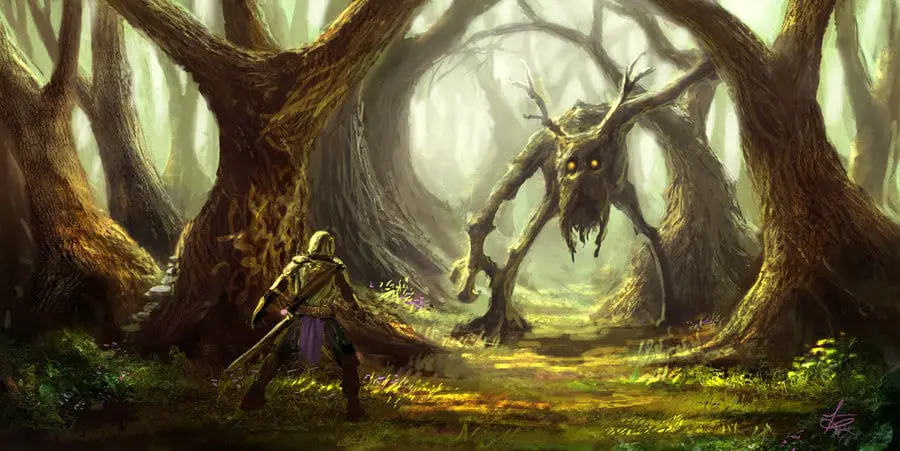
Final Comments
- All of this also nicely parallel’s Aragorn’s internal journey to overcome his indecision in the last few chapters. I’m enjoying how much The Two Towers is so far playing with the difficulties of decision-making in the face of a need for action.
- There was SO, SO much to talk about in this chapter. Please feel free to bring up anything else in the comments. I didn’t even talk about the Entwives. Though if we’re being honest, this is the last word in that debate.
- I like Treebeard’s description of Saruman: “His face as I remember it – I have not seen it for many a day – became like windows in a stone wall: windows with shutters inside. I think I now understand what he is up to. He is plotting to become a Power. He has a mind of metal and wheels; and he does not care for growing things, except as far as they serve him in the moment.”
- Tolkien is still really making all of these chapter breaks work for him. I am enjoying how often – as a man who likes long, multi-phrase sentences – he’ll end a chapter with something short and succinct in contrast. Also, gutsy move with the double-colon, Tolkien, you mad-man. “There was a noise like wind in many branches. The Ents were drawing near to the crest of the ridge now, and all song had ceased. Night fell and there was silence: nothing to be heard save a faint quiver of the earth beneath the feet of the Ents, and a rustle, the shade of a whisper as to many drifting leaves. At last they stood upon the summit and looked down into a dark pit: the great cleft at the end of the mountains: Nan Curunír, the Valley of Saruman.
“Night lies over Isengard,” said Treebeard. - We talked last week about how M&P are brighter than they are given credit for, but I side-eyed them heavily for drinking forest water despite their experiences along the Withywindle. But hey: if you’re thirsty, you’re thirsty.
- Tolkien remains excellent at understatement comedy. When Treebeard asks him for news of the outside world, Merry solemnly replies that “There is quite a lot going on.” You’re not wrong, Merry.
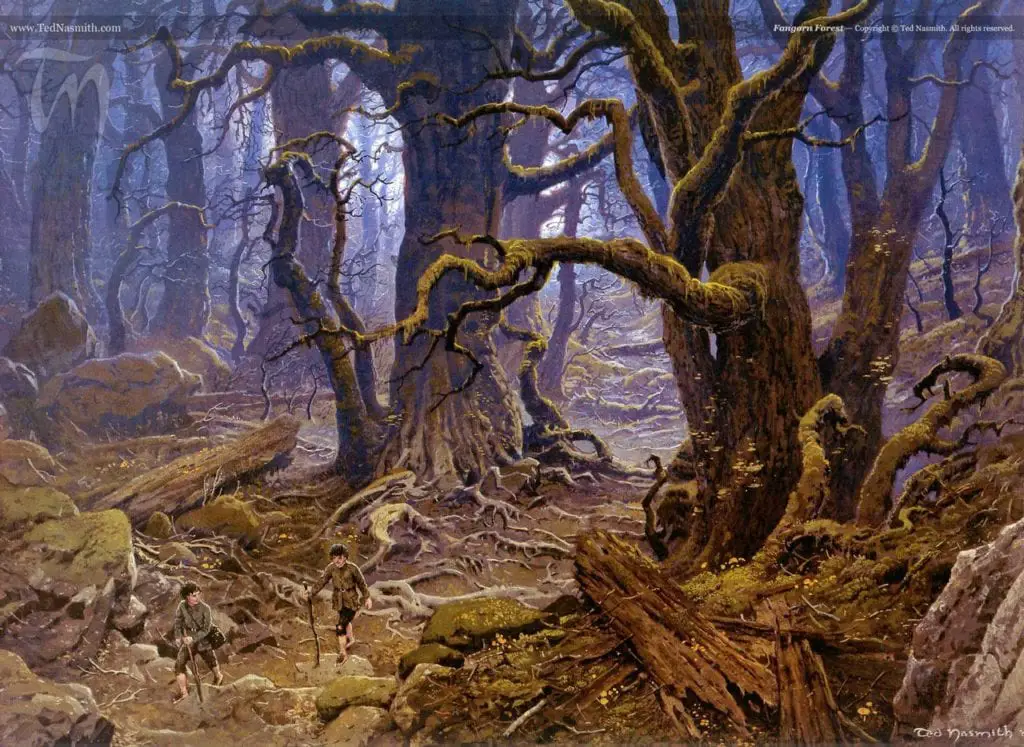
- I really enjoyed how the old Entish lists described men: “Man the mortal, master of horses.” It’s a nice detail and it makes sense that they’d see all men through the lens of Rohan.
- For all of Tolkien’s naming prowess, “Derndingle” – the site of the Entmoot – made me laugh for about five minutes. A ‘dingle’ is an actual term, though, so perhaps English landscape vocabulary is the true villain / hero in this particular tale.
- Prose Prize: There are too many lovely forest descriptions in “Treebeard” for anyone to possibly expect me to choose just one. So I’m going to take a handful from the section of the chapter where Treebeard and the hobbits approach Wellinghall.
- “The day waned, and dusk was twined about the boles of the trees.”
- “Stars were shining already in lakes between the shores of cloud.”
- “It was faint, but it reminded them of the smell of a distant wood borne from afar by a cool breeze at night.”
- Contemporary to this chapter: As Merry and Pippin are meeting Treebeard, a far distance to the east Frodo and Sam are meeting Gollum. It’s nice that both sets of hobbits meet these pivotal figures in their journies right around the same time. The Entmoot itself takes up a big chunk of time. It’s contemporary to all of Aragorn’s time in Fangorn and Edoras as well as Frodo and Sam’s trip across the Dead Marshes.
- Éowyn countdown: Two! Some guy has to shove his way back into the narrative next week, then we’re there!
Art is courtesy of (in order of appearance): Manadhiel, Peter Xavier Price, Jian Guo, Dan Pilla, Miruna Lavinia, Jereme Peabody, and Ted Nasmith

